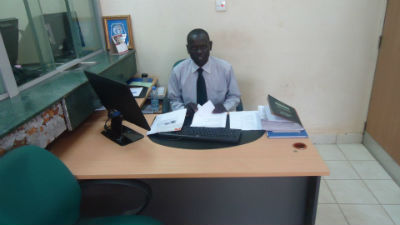![Bona Machar Nya [File photo]](http://www.southsudannewsagency.com/wp-content/uploads/2014/05/Bona%20Machar%20Nya-SSNA.jpg) By Bona Machar Nyak
By Bona Machar Nyak
May 15, 2014 (SSNA) — Federal system is system where political authority is divided between two autonomous sets of governments, one national and the other subnational, both of which operate directly upon the people. Usually a constitutional division of power is established between the national government, which exercises authority over the whole national territory, and provincial governments that exercise independent authority within their own territories.
The principal agencies of federal government are a bicameral legislature, composed of Members of Parliament at national level representing the people directly and a County members parliament at the states representing the constituent members as entities; an executive branch elected by both houses of the legislature in joint session; and a supreme court that renders decisions on matters affecting national and sub-national federal relations. The national government consists of the executive branch, led by the nationally elected president; the parliament; and a judicial branch that resolves constitutional matters.
In other systems, federal arrangements are found in conjunction with a large measure of cultural homogeneity. The Constitution of the United States delegates to the federal government certain activities that concern the whole people, such as the conduct of foreign relations and war and the regulation of interstate commerce and foreign trade; certain other functions are shared between the federal government and the states; and the remainder are reserved for the states. Although these arrangements require two separate bodies of political officers, two judicial systems, and two systems of taxation, they also allow extensive interaction between the federal government and the states. Thus, the election of Congress and the president, the process of amending the Constitution, the levying of taxes, and innumerable other functions necessitate cooperation between the two levels of government and bring them into a tightly interlocking relationship.
The South Sudan nation has been under Authoritarian leadership since independence by imposing unitary system of government on citizens of this great nation while many of its informed citizens were dreaming of the Federalism form of government in which sovereignty is constitutionally divided between a central governing authority and constituent political units such as states or provinces. Federalism is a system based upon democratic rules and institutions in which the power to govern is shared between national and provincial/state governments. This is by far the most advanced and comprehensive example of the new phenomenon of federal linkages as it paves the way for the citizenry dignity that results in the mobilization toward meaningful development.
South Sudan should adapt this system of government since its decentralized powers and devolved resources down to our counties, it democratize all public and private institutions and promote the rule of law. With federal state citizens are able to enjoy their democratic right under constitutionalize policies enshrined in our legal documents which should be in the custody of qualified and independent personnel in our judiciary. We will have all our public and private institutions empowered by our constitution to carry their duties as stipulated but not guided by any individuals in the government.
Due to lack of political goodwill inspired by dictatorship tendencies in the republic of South Sudan corruption became part of the systems in both public and private sector the common types of corruption in South Sudan are extortion, nepotism, embezzlement, bribery, cronyism, patronage, and graft. This is because there is lack of clear rules governing private and public sector, weak enforcement of law and order due to manipulation of law by politicians or public servants, poor governance both in private and public sector. Corruption undermines economic development, it undermines political stability, and it jeopardizes the allocation of resources to sectors crucial for development.
Due to the unaccountable corruption by the government of South Sudan under the leadership of President Kiir and his allies South Sudan was levelled on the top list of the Failed States Index and ranked 18th of the top 20th poorest country in the world. All these are attributed to the types of government systems in place, South Sudanese believes that the country has a lot of natural resources which can make it necessary to be the fastest ever growing economy country in the world, it has potentials technocrats which if utilized properly can set good policies for strong governance in our public and private institutions and all these can be achieved only if Federalism is capitalised and instituted in our country. This system of government is well utilized in Nigeria, Ethiopia, India, Switzerland, Brazil, Australia just to mention a few. South Sudan should opt for the INDIA federal system of government which has three tier I.E National government, State government and County government each of these tiers has its own function as stipulated in the constitution. South Sudanese hope the proposed federal system of government proposed in Addis negotiating table is not just a mere system of government but a meaningful system of government that will resolved all problems South Sudanese are going through.
Bona Machar Nyak is a concern citizen currently residing in Kenya and he can be reached at [email protected].

